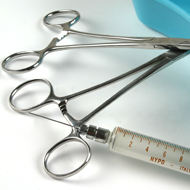
Autonomous surgery may bring better efficacy and safety
Scientists in the United States have carried out robotic soft tissue surgery in a large animal for the first time.
A study published in the journal Science Translational Medicine describes how the scientists carried out supervised autonomous surgery in pigs.
Using a robot known as STAR (Smart Tissue Autonomous Robot), the scientists accessed the intestines of four pigs through a laparotomy and compared the procedure to a surgeon using standard surgical hand tools.
Researchers say that the results demonstrate that autonomous surgery can bring ‘better efficacy, safety, and access to the best surgical techniques regardless of human factors including surgeon experience’.
Although robot-assisted surgery is becoming increasingly common, the execution of surgical tasks on soft tissue remains entirely manual.
To see if the task could be performed by an autonomous machine, the scientists developed a soft tissue robot consisting of a lightweight robotic arm extended with a laparoscopic suturing tool.
Equipped with smart imaging technologies, the STAR robot then carried out various soft tissue surgical tasks and compared them to those of experienced surgeons. The robot is programmed by a computer that generates a plan to complete complex surgical tasks.
In the pig trials, the average STAR procedure took over 50 minutes, while the ‘open’ surgery took just eight. However, this is comparable to the average for clinical laparoscopic anastomoses that range from 30 to 50 minutes. No complications were observed in the seven days following surgery.
‘This task represents a proof of concept for all potential soft tissue surgical tasks requiring repetition precision, accuracy, and efficiency that can potentially benefit from autonomous or supervised autonomous functionality,’ the researchers conclude.
‘Further miniaturisation of tools and improved sensors will allow for wider use even at smaller scales.’



 The latest
The latest